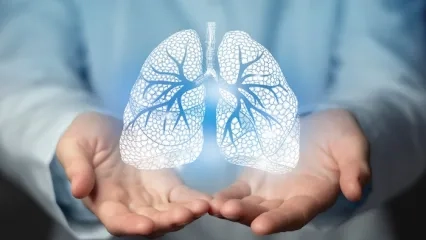Alo Yeditepe
Alo Yeditepe
4 Significant Preliminary Symptoms of Lung Cancer
Lung cancer is the most common type of cancer that causes loss of life in our country as well as all over the world. And mostly sneaky. Therefore, two-thirds of patients are at an advanced stage when they are diagnosed. Noting that some patients may show symptoms in the early period, Chest Diseases specialist Asst. Prof. Dr. Seha Akduman: ''When these symptoms are taken into account, it is possible to catch the disease early and achieve more effective results in treatment.
The most common symptoms of lung cancer are cough, bloody sputum, chest pain, hoarseness, weight loss of unknown cause, shortness of breath, newly occurring wheezing, difficulty in treatment, and recurrent pneumonia. Apart from these symptoms, symptoms such as unilateral drooping eyelids, numbness in the arm, pain, weakness, loss of muscle strength, and head and neck edema are also observed. Pointing out that all these signs and symptoms may vary depending on the location and size of the tumor, Yeditepe University Koşuyolu Hospital Chest Diseases Specialist Asst. Prof. Dr. Seha Akduman described four important precursor symptoms of lung cancer.
• Persistent Cough
Although cough is the most common complaint of lung cancer, it is also among the first symptoms. Dr. Akduman stated that it is necessary to be alert in case of persistent coughing and added the following: "The cough that occurs due to colds or respiratory infections disappears within a week or two. However, extreme caution should be exercised, and a physician should be consulted if it lasts longer than three weeks or if the severity and frequency of the current cough increases. A lesion that develops inside the windpipe can develop into a sputum cough and bloody cough as it first begins as a dry cough and grows.”
• Change in Cough
Especially people who smoke for a long time do not pay attention to the chronic cough they experience and think that the situation is caused by smoking and can loss of time. Asst. Prof. Dr. Seha Akduman: ''Smokers should pay special attention to the changes in their cough. It is very important not to waste time in cases such as increased cough, increased sputum, bloody sputum, and coarsening of breathing sounds while coughing. People may not notice these changes. Therefore, their relatives should also be careful. It should not be forgotten that there is no difference between day and night in coughs caused by tumors and there is no difference in meals. There is also little response to cough medicines.”
Reminding that approximately one-third of tumors originate from the airway and that cells with rich uncontrolled proliferation tend to bleed, Asst. Prof. Dr. Seha Akduman continued: “Bloody sputum is one of the most important findings for all lung diseases, especially lung cancer. Pneumonia develops in the lung areas where the bronchus occluded by the tumor is opened. If radiological and clinical improvement cannot be achieved or pneumonia recurs, a bronchoscopy should be performed. Therefore, bronchoscopy should be performed if bloody sputum and recurrent pneumonia are observed in individuals over forty years of age who smoke.
• Difficulty In Breathing
Shortness of breath is defined as the realization of our breathing that we normally perform without realizing it. In case of shortness of breath in the main trachea inside the large airways, wheezing occurs. In the presence of lung cancer, the tumor can cause shortness of breath according to its prevalence and location, unless it occupies a very large area in the lung areas where gas exchange is provided. Complaints can occur during intense exercise or without any effort.
Reminding that the onset of shortness of breath, especially in smokers, can be an early predictor of COPD as important as lung cancer, Yeditepe University Hospital Chest Disease Specialist Asst. Prof. Dr. Seha Akduman: “If the tumor is located in the pleura or chest wall, chest pain that increases with deep breathing can be seen mostly unilateral and continues for hours. This type of pain often has a poor response to painkillers. Fluid often occurs in pleural effusion, and fluid that presses on the lungs can cause shortness of breath, chest pain, and shoulder pain. As the number of fluid increases, it may be accompanied by increased respiratory rate, inability to lie flat, and bruising on the lips."
• Hoarseness
Since a tumor developing in the upper lobes of the lungs can cause hoarseness by compressing the nerves, it is necessary to consult a physician in hoarseness lasting more than ten days without an underlying problem such as infection or reflux. However, the presence of any tumor can also cause droopy eyelids, and edema on the face and upper part of the body.
Who, When, and What to Do?
As in all types of cancer, it should not be forgotten that early diagnosis saves lives in lung cancer, emphasized Yeditepe University Hospital Specialist Asst. Prof. Dr. Seha Akduman, and concluded: “Annual chest radiographs of those working in occupational groups exposed to toxic substances, especially smokers, those with a family history of cancer, screening with low-dose tomography in high-risk groups over 55 years of age, bronchoscopy examination in unexplained cough and recurrent pneumonia are definitely recommended.”
Press Coverage: gazetevatan.com | cnnturk.com | haberler.com | yenicaggazetesi.com | mynet.com
About
Faculty and Year of Graduation:
Gazi University Faculty of Medicine, 2007
”
See Also
- How to Cleanse Your Lungs?
- Is Breathing Air Dangerous in Fires?
- What is Electronic Cigarette Disease (EVALI)? EVALI Symptoms and Treatment
- What is COPD? Symptoms and Treatment of COPD
- Long Journeys Increase the Risk of Embolism!
- What Asthma and COPD Patients Should Pay Attention to When Using Air Conditioning!
- What is Allergy? What are the Symptoms of Allergy?
- What is Desert Dust? Harms of Desert Dust
- Lung Cancer Screening Age
- What is Good for Cough? How to Cure Cough?
- Lung Cancer Symptoms and Treatment
- 10 Ways to Have a Sound Sleep in the Heat
- What Should Asthma Patients Be Cautious About?
- Does Poor Quality Sleep Increase The Risk of Asthma?
- What Causes Insomnia, Diagnosis and Treatment
- 9 Common Misconceptions About COPD
- Causes, Symptoms, and Treatment of Asthma
- Allergy and Asthma During Pregnancy
- It Is Aimed to Eliminate Tuberculosis Worldwide By 2030
- Lung Patients Should Not Stop Their Medications
- How Does Acid Rain Affect Human Health?
- The Slowing Traffic in Istanbul Increases the Risk of Cancer!
- The American Cancer Society Has Announced; The Age of Screening For Lung Cancer Has Decreased
- Hidden Lung Cancer Cases Revealed in Tomographs Taken Due to Coronavirus
- Obesity is Both a Cause and Consequence of Sleep Apnea
- Asthma and COPD Attack Season Begins
- Lung Cancer
- Snoring and Its Treatment
- Using Antipyretics Uncontrolled Can Hide Pneumonia Symptoms
Alo Yeditepe




